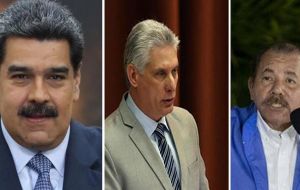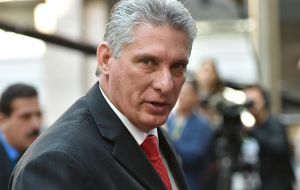MercoPress. South Atlantic News Agency
Bolton announces further crackdown on “the three stooges of socialism”
 “The troika of tyranny — Cuba, Venezuela and Nicaragua — is beginning to crumble,” Bolton said in a hard-hitting speech near Miami
“The troika of tyranny — Cuba, Venezuela and Nicaragua — is beginning to crumble,” Bolton said in a hard-hitting speech near Miami  The measures seem likely to hit hardest in Cuba, which faces severe economic weakness as it struggles to find cash to import basic food and other supplies
The measures seem likely to hit hardest in Cuba, which faces severe economic weakness as it struggles to find cash to import basic food and other supplies  “Nobody will snatch away from us, through seduction or force, 'the Fatherland that our parents won for us by standing up,'” President Miguel Díaz-Canel said
“Nobody will snatch away from us, through seduction or force, 'the Fatherland that our parents won for us by standing up,'” President Miguel Díaz-Canel said The Trump administration on Wednesday intensified its crackdown on Cuba, Nicaragua and Venezuela, rolling back Obama administration policy and announcing new restrictions and sanctions against the three countries whose leaders national security adviser John Bolton dubbed the “three stooges of socialism.”
“The troika of tyranny — Cuba, Venezuela and Nicaragua — is beginning to crumble,” Bolton said in a hard-hitting speech near Miami on the 58th anniversary of the United States' failed Bay of Pigs invasion of the island, an attempt to overthrow the Cuban government.
The measures seem likely to hit hardest in Cuba, which is at a moment of severe economic weakness as it struggles to find cash to import basic food and other supplies following a drop in aid from Venezuela and a string of bad years in other key economic sectors.
Bolton announced a new cap on the amount of money that families in the United States can send their relatives in Cuba. The Obama administration had lifted limits on remittances, but the new limit will be US$ 1,000 per person per quarter. Remittances to Cuba from the United States amounted to US$ 3 billion in 2016, according to the State Department.
Washington also moved to restrict “non-family travel” after a broad loosening of so-called purposeful visits under Obama led to soaring numbers of American trips for cultural and educational exchanges. Details on the restrictions were not immediately clear, but tourism is a key lifeline of hard currency for Cuba. Bolton called such visits “veiled tourism.”
Bolton spoke hours after Secretary of State Mike Pompeo announced a new policy allowing lawsuits against foreign firms operating on properties Cuba seized from Americans after the 1959 revolution. The United States has enforced a trade embargo against Cuba since the early 1960s.
Cuban officials met the announcements with defiance. “Nobody will snatch away from us, neither through seduction nor force, 'the Fatherland that our parents won for us by standing up,'” President Miguel Díaz-Canel said via Twitter. “We Cubans will not surrender.”
Foreign Minister Bruno Rodríguez called it an attack on international law, Cuban sovereignty and countries that would do business with the island: ”Aggressive escalation by (hashtag) US against Cuba will fail. Like at Giron, we will be victorious,“ he tweeted, referring to a Bay of Pigs beach where invaders landed.
”We will always be willing to have a dialogue based on absolute respect, but if the U.S. government has chosen a confrontational path we will not hesitate to defend the gains of the revolution at any cost,“ Rodríguez later said on state television.
On Venezuela, Bolton said Washington was sanctioning the country's Central Bank, which the Trump administration says has been instrumental in propping up the embattled government of President Nicolás Maduro. The sanctions do not bar humanitarian aid or private remittances and aim to ensure reliability of debit and credit card transactions, which have become essential amid skyrocketing inflation and a shortage of cash notes.
Maduro called the move the latest example of ”imperialist aggression.“ In a nationally broadcast TV appearance, he said any nation's central bank is ”sacred“ and deserves respect. ”I see imperialism as crazy, desperate,“ Maduro said.
Bolton also announced sanctions against financial services provider Bancorp, which he claimed is a ”slush fund“ for Nicaraguan President Daniel Ortega.
”The United States looks forward to watching each corner of this sordid triangle of terror fall: in Havana, in Caracas, and in Managua,“ Bolton said in South Florida, which is home to many thousands of exiles and immigrants from the three countries.
Pompeo's decision on allowing lawsuits lets Americans, including Cubans who became naturalized citizens, sue companies that operate out of hotels, tobacco factories, distilleries and other properties nationalized after Fidel Castro took power.
Pompeo said he would not renew a bar on litigation that has been in place for two decades, meaning lawsuits can be filed starting May 2, when the current suspension expires.
The Justice Department has certified roughly 6,000 claims as having merit, said Kimberly Breier, the top U.S. diplomat for the Americas. Those claims have an estimated value of US$ 8 billion: US$ 2 billion in property and US$ 6 billion in interest, she said. An additional 200,000 uncertified claims could run into the tens of billions of dollars, she said.
Breier said there would be no exceptions to the policy, but foreign companies ”will have nothing to worry about if they are not operating on properties taken from Americans.“
Nonetheless, companies in the European Union and Canadian companies stand to lose tens of billions in compensation and interest, and the decision prompted stern responses and vows to protect businesses from lawsuits.
In a statement, EU foreign policy chief Federica Mogherini and Canadian Foreign Minister Chrystia Freeland called the decision to remove the longstanding waivers ”regrettable“ and said it ”can only lead to an unnecessary spiral of legal actions.”




Top Comments
Disclaimer & comment rulesCommenting for this story is now closed.
If you have a Facebook account, become a fan and comment on our Facebook Page!